情态动词--Revision Modal Verbs
鲁教版(五四学制)九年级英语全一册:Unit 3 It must belong to Carla.

Name Group ClassPeriod 5 Revision【Topic】Make inferences.【Get ready before class】一、知识梳理本单元话题:神秘事件(Mysteries),能根据相关信息做推断(Make inferences)。
1.情态动词(1)情态动词(Modal verbs)表示说话者的语气和情态,无人称和数的变化;本身虽有一定的意义,但不能独立作谓语,后接动词原形,一起构成谓语。
常用来表示说话人对有关行为或事物的态度和看法,认为其可能、应该或必要等;或用来表示推测或判断。
(2)情态动词表推测:(3)句型结构:A: Whose hair band is this? B: It must be Carla’s.A: It could be Mei’s hair band. Or it might belong to Linda. They both have long hair.B: It can’t belong to a boy.2.连接词或短语:so, as, because, since, but, however, though, not only…but also, or, when, while单元词汇、句型分课时过关Section A 1a-2d一、单词1. 谁的2. 卡车3. 野餐4. 野兔5. 参加6. 宝贵的7. 粉红色的8.任何人二、词组1. 她最喜爱的作家2. 在野餐中_________ ____3. 听流行音乐____ _____4. 属于________5. 发带____________6. 参加音乐会_________________________三、句子1.这是谁的排球?它一定是Carla的。
她爱打排球。
_______________________________________________________________________________ 2.这是谁的发带?_______________________________________________________________________________ 3.它可能是Mei的发带。
MODAL VERBS(情态动词)复习讲稿

MODAL VERBS(情态动词)复习讲稿●情态动词的特点:1.没有人称和数的变化。
2. 有些情态动词有过去式的变化:e.g. will → would , can → could , may→ might ,dare → dared●情态动词的否定式: 情态动词+ not +动词原形can not: can't , must not:mustn't , need not : needn't●情态动词的用法及相互区别, 是考试的内容之一。
1. can , be able to be able to 表示经过努力后, 能够做到; be able to 有多种形式的变化。
can 1). 表示体力或脑力方面的能力; 2). 表示允许、可能性。
could 是can的过去式, 表示过去有能力及过去存在的可能性 ; 用于疑问句表示委婉地提出问题。
1). The fire spread through the hotel very quickly but everyone ____ get out. (NMET 97 )A. had toB. wouldC. couldD. was able to 2). She asked if she could keep the book for another two days.3). -Will you stay for lunch?-Sorry, __ . My brother is coming to see me. (NMET99)A. I mustn'tB. I can'tC. I needn'tD. I won't2.may 表示询问或说明一件事可不可做 ; 表示某事有可能发生。
might 是may的过去式; 用在疑问中比may委婉、客气。
1). -May I take this book out of the reading-room?-No, you mustn't. ( Yes, you may.)2). -Might I make a suggestion? -Yes, you may.3. must 1). 表示必须要做的事: 必须2). 表示很有把握的推断: 一定, 准是。
专题九情态动词(new)Model Verbs
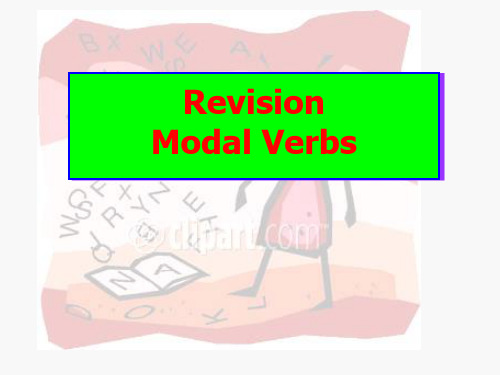
9.表猜测语气的反意疑问句的构成
He must be reading,________? isn’t he
What he said can’t be true,____________? is it
He must have gone over the article, __________? hasn’t he
Can this news be true? 的态度(主要用于否定句, How can you be so foolish? 疑问句和感叹句中)” (19)
can/could:
can never/can’t……too表示“无论怎样…也 不过分”,“越…越好” 。
You can’t be too careful 你过马路的时候再小心也不为过。 while crossing the road.
We should be strict with ourselves. 表劝告和建议“应该”
They should have arrived by two o’clock. 表推测,“可能,应该” You are mistaken, I should say. 用于第一人称,表示说话人的一种谦逊,客气,委婉
may 和can
• A computer _______ think for itself; it must be told what to do. • A. can’t B. couldn’t • C. may not D. might not 表客观“可能” 表主观“可能”
A
•may ______________ can____________ 不可能 可能不 •cannot___________ may not__________ Her grandpa _________ well be over 100. may/might I __________ as well start at once. may/might
modal verb(情态动词)
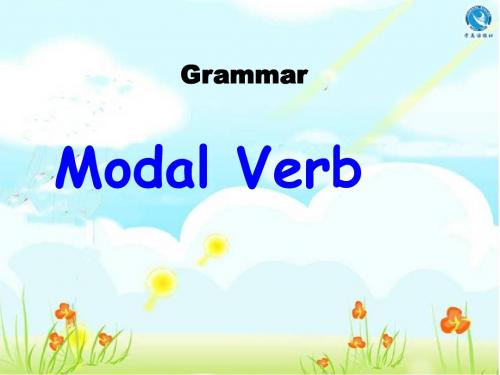
Modal Verb
什么是情态动词? (Modal Verbs) 情态动词表示说话人的某种 感情或语气,对某一动作 或状态的某种态度。 表示“需要、可以、 必须、应当”等。
情态动词的语法特征
1. 情态动词不能单独做谓语,除ought 和have外,后面只能接不带to的不定式。 2. 情态动词没有人称,数的变化,但有 些情态动词,如can, will也有一般式 和过去式的变化。
may 常用来表示: A. 表示请求、允许: B. 表示说话人的猜测: “也许” “可 能”: 通常只用于肯定句和否定句中。
C. 表示祝愿; 但语气较正式: might 的用法有: 多在间接引语中表示过去的可能和允 许。如: She said that he might take her bike. 她说他可以拿她的自行车去用。
表示现在的许可,语气比may 较委婉,
一般用于疑问句(包括间接疑问句),
不可用于肯定句或者否定句。
如: Might I have a word with you?
我可以和你说句话吗?
will和would
1. will是助动词还是情态动词?
will用于构成将来时是助动词。
用于表示“意志”“决心”“请求”是
2. 表示否定的情态动词的用法:
部分情态动词的否定式是情态动词中的 考点之一。 mustn’t 不准; 禁止 needn’t 没必要 ( = don’t have to ) can’t 不能; 不可能 may not 不可以; 可能不 shouldn’t 不应该 ( = ought not to )
表示主语的义务或责任: You should take care of your sister. 你应当去照顾你妹妹。 或指出一个正确、明智的动作: They shouldn't allow parking here; the street is too narrow. 这儿不该允许停车;马路太窄了。
M3-AC14-grammar-情态动词--modal-verbs
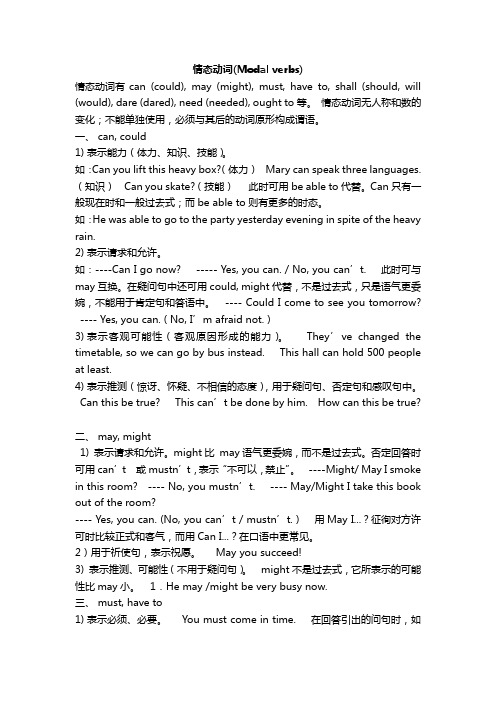
情态动词(Modal verbs)情态动词有can (could), may (might), must, have to, shall (should, will (would), dare (dared), need (needed), ought to等。
情态动词无人称和数的变化;不能单独使用,必须与其后的动词原形构成谓语。
一、can, could1)表示能力(体力、知识、技能)。
如:Can you lift this heavy box?(体力)Mary can speak three languages.(知识)Can you skate?(技能)此时可用be able to代替。
Can只有一般现在时和一般过去式;而be able to则有更多的时态。
如:He was able to go to the party yesterday evening in spite of the heavy rain.2)表示请求和允许。
如:----Can I go now? ----- Yes, you can. / No, you can’t. 此时可与may互换。
在疑问句中还可用could, might代替,不是过去式,只是语气更委婉,不能用于肯定句和答语中。
---- Could I come to see you tomorrow? ---- Yes, you can. ( No, I’m afraid not. )3)表示客观可能性(客观原因形成的能力)。
They’ve changed the timetable, so we can go by bus instead. This hall can hold 500 people at least.4)表示推测(惊讶、怀疑、不相信的态度),用于疑问句、否定句和感叹句中。
Can this be true? This can’t be done by him. How can this be true?二、may, might1) 表示请求和允许。
高考情态动词用法总结
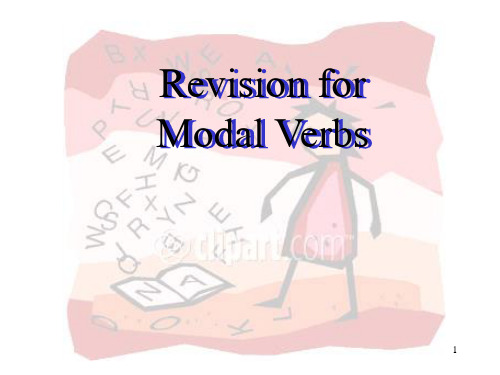
再……也不为过,越……越好。
虚拟语气
虚拟语气的概念
They insisted that the boy (should) go with them.
注意:suggest 当表示“暗示、表明“讲时,insist 表示”坚持认 为“之意时,应用陈述语气。 The smile on his face suggested that he was satisfied with our work.
Yes, you must. No, needn’t /don’t have to.
④ Need I finish it now?
Yes, you must. No, you needn’t.
11
典型错误
1. He mustn’t be in the classroom. ( Can’t ) 2. You might leave the bag on the bag. ( might have left) 3. You must have seen the film last week, have’t you?
+ have +p.p 表示本应该做而未做。
Eg. You should have been five minutes ago.
6
Will/ would
1、表示意愿
I’ll try my best to overcome the difficulty. 2、表示意图
情态动词(Modal Verbs)

另一类意思涉及必须做某事或允许做某 事之类的意思:情态动词可以用来表示 某人必须做某事、某人能做某事,如果 某事发生(或不发生)就会好一些,或 者某事是许可或禁止的。
一、表示有把握的程度 情态动词可以表达对于某一事实 或事件有把握的各种不同程度。
a完全有把握(肯定的或否定的)
1. shall用于第一人称: I/We shall be away tomorrow. I shan’t be late on Wednesday. 2. will 用于各种人称: That’s the phone. That’ll be Tony. Things will be right. It won’t rain this evening. You’ll be right.
情态动词 modal verbs
情态动词 情态动词 的 特点
1)有特定的词义 ) 2)没有人称和数的变化 ) 3)其后加动词原形(do), have done ,be doing. )其后加动词原形
易混易错用的情态动词
1。区别must / have to 。区别 Must表示人在主观上认为的必要、必须、一定要 表示人在主观上认为的必要、 表示人在主观上认为的必要 必须、 Have to表示受环境或习惯支配的客观必要 表示受环境或习惯支配的客观必要 不得不” 能用于更多时态。 “不得不”,能用于更多时态。 1)Soldiers ________obey officers. must have to 2)It’s raining outside.We_________stay at home. 3As he had broken his leg, he had to , ______lie in bed.
can’t, couldn’t
情态动词与情感动词

情态动词与情感动词情态动词和情感动词在英语中都是语法中的一种特殊词汇,它们在句子中起到了不同的作用。
了解并正确使用情态动词和情感动词对于掌握英语语法和表达准确的情感非常重要。
在本文中,我们将深入探讨情态动词和情感动词的用法和区别。
一、情态动词情态动词(Modal Verbs)是用来表达或者修饰说话人的观点、态度、能力、愿望、建议等情态的一类特殊动词。
它们与动词的共同特征是没有词义上的内容,只有情态或语气上的含义。
英语中典型的情态动词包括can, could, may, might, must, shall, should, will, would等。
情态动词的用法和特点如下:1.情态动词后面接动词原形,不加s/es。
例如:I can speak English fluently.2.情态动词在疑问句和否定句中的用法与一般动词相反。
例如:Can you come with me? (肯定句) Can't you come with me? (否定句)3.情态动词通常不带有时态的意义,其时态意义由后面的动词来表示。
例如:I can play the piano. (现在时) I could play the piano when I was young. (过去时)4.情态动词可以用于表示推测、可能性、必要性、义务、建议等。
例如:He must be at home. (推测) You should apologize to him. (建议)二、情感动词情感动词(Emotion Verbs)是用来表示个体情感、感受、意愿、态度等的一类动词。
与情态动词类似,情感动词也常常用来表达个体的情感状态,它们在句子中的用法有一些共同点。
英语中常见的情感动词包括love, like, hate, enjoy, prefer, feel等。
情感动词的用法和特点如下:1.情感动词后面可以接动词的-ing形式或名词形式。
高中英语情态动词变形规则总汇

高中英语情态动词变形规则总汇1. 情态动词(Modal Verbs)是一类特殊的助动词,用于表示说话人对某种行为、状态或意愿的态度、推测、能力、可能性等。
情态动词有一些变形规则需要注意。
2. can/could- Can用于表示能力、允许、许可等,表示现在或将来的情况;could用于表示过去的情况。
- can和could的否定形式为can't/cannot和couldn't。
- can/could没有第三人称单数的形式,也不加-s。
3. may/might- May用于表示许可、推测、可能性等;might表示过去或未来的推测、可能性等。
- may和might的否定形式为may not/might not。
- may/might没有第三人称单数的形式,也不加-s。
4. must- Must用于表示肯定、必须、推测等。
- must的否定形式为must not或mustn't。
- must没有第三人称单数的形式,也不加-s。
5. shall/should- Shall用于表示将来、意愿、建议等;should表示应该、建议等。
- shall和should的否定形式为shall not/should not。
- shall/should没有第三人称单数的形式,也不加-s。
6. will/would- Will用于表示将来、意愿等;would用于表示过去的意愿、惯常的动作等。
- will和would的否定形式为will not/won't和wouldnot/wouldn't。
- will/would没有第三人称单数的形式,也不加-s。
7. ought to- Ought to用于表示应该、理应等。
- ought to的否定形式为ought not to。
- ought to没有第三人称单数的形式,也不加-s。
8. need- Need用于表示需要、必需等。
- need的否定形式为need not或don't need to。
情态动词与动词不定式的区别

情态动词与动词不定式的区别在英语语法中,情态动词和动词不定式是两个重要的语法概念。
虽然它们都涉及动词的使用,但在用法和功能上存在一些明显的区别。
本文将对情态动词和动词不定式进行比较,以帮助读者更好地理解它们的区别。
一、情态动词的特点情态动词(Modal Verbs)是一类特殊的动词,它们用来表示说话人的意愿、能力、推测、建议、命令等情态。
情态动词包括can、could、may、might、shall、should、will、would、must等。
下面是情态动词的一些特点:1. 后面跟动词原形。
情态动词本身并不具备时态和人称的变化,后面的动词要用原形,即不带to的动词形式。
- 例1:I can swim.(我会游泳。
)- 例2:She may leave early.(她可能会早退。
)2. 具备情态的意义。
情态动词本身有一定的意义,表示说话人的态度、观点或推测、许可等情态,而且它们往往没有独立的意义。
- 例1:You should apologize to her.(你应该向她道歉。
)- 例2:He must be busy.(他一定很忙。
)3. 不能单独作谓语。
情态动词通常需要与其他动词结合使用,构成谓语。
- 例1:He can play the piano.(他会弹钢琴。
)- 例2:We should study harder.(我们应该加倍努力学习。
)二、动词不定式的特点动词不定式(Infinitives)是动词的一种形式,通常由to加上动词原形组成。
动词不定式在句子中可以充当名词、形容词或副词。
下面是动词不定式的一些特点:1. 由to加动词原形构成。
形式上,动词不定式由to加上动词原形组合而成。
但是在某些情况下,不定式也可以省略to。
- 例1:I want to go swimming.(我想去游泳。
)- 例2:He can swim.(他会游泳。
)2. 可以有时态和人称的变化。
不定式在使用时可以根据上下文的需要进行时态和人称的变化。
_情态动词(Modal Verb)
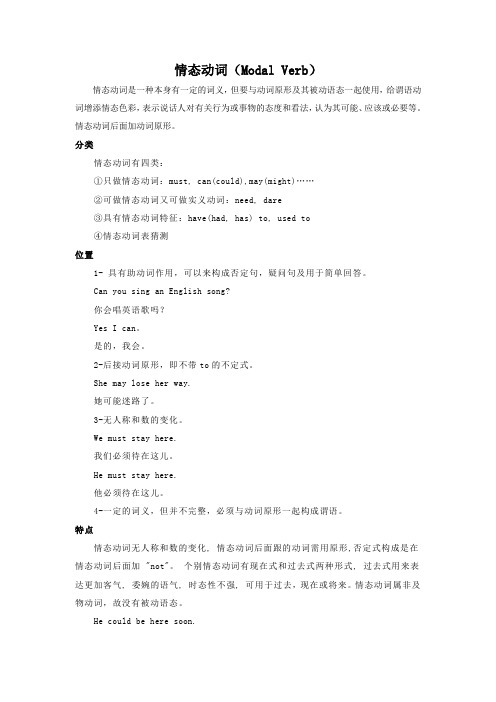
情态动词(Modal Verb)情态动词是一种本身有一定的词义,但要与动词原形及其被动语态一起使用,给谓语动词增添情态色彩,表示说话人对有关行为或事物的态度和看法,认为其可能、应该或必要等。
情态动词后面加动词原形。
分类情态动词有四类:①只做情态动词:must, can(could),may(might)……②可做情态动词又可做实义动词:need, dare③具有情态动词特征:have(had, has) to, used to④情态动词表猜测位置1- 具有助动词作用,可以来构成否定句,疑问句及用于简单回答。
Can you sing an English song?你会唱英语歌吗?Yes I can。
是的,我会。
2-后接动词原形,即不带to的不定式。
She may lose her way.她可能迷路了。
3-无人称和数的变化。
We must stay here.我们必须待在这儿。
He must stay here.他必须待在这儿。
4-一定的词义,但并不完整,必须与动词原形一起构成谓语。
特点情态动词无人称和数的变化, 情态动词后面跟的动词需用原形,否定式构成是在情态动词后面加 "not"。
个别情态动词有现在式和过去式两种形式, 过去式用来表达更加客气, 委婉的语气, 时态性不强, 可用于过去,现在或将来。
情态动词属非及物动词,故没有被动语态。
He could be here soon.他很快就来。
We can't carry the heavy box.我们搬不动那箱子。
I'm sorry I can't help you.对不起,我帮不上你。
基本助动词与情态助动词最主要的区别之一是:基本助动词本身没有词义,而情态助动词则有自己的词义,能表示说话人对有关动作或状态的看法,或表示主观设想:What have you been doing since? (构成完成进行体,本身无词义)I am afraid I must be going. (一定要)You may have read some account of the matter. (或许已经)除此之外,情态助动词还有如下词法和句法特征:1)除ought和used以外,其他情态动词后面只能接不带to的不定式。
情态动词英语语法知识精讲
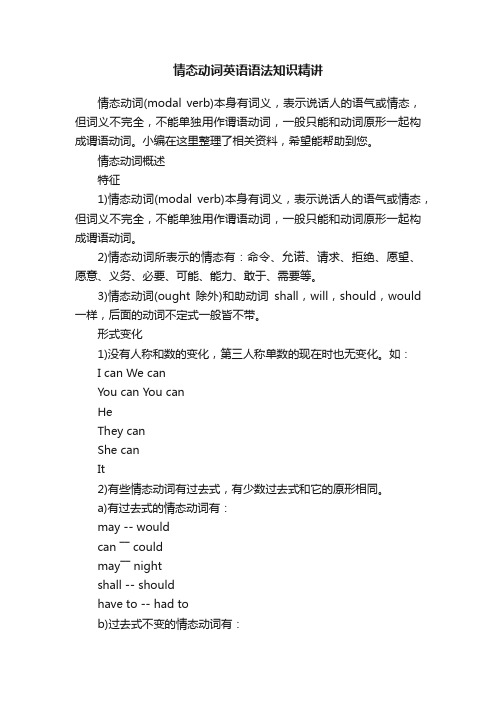
情态动词英语语法知识精讲情态动词(modal verb)本身有词义,表示说话人的语气或情态,但词义不完全,不能单独用作谓语动词,一般只能和动词原形一起构成谓语动词。
小编在这里整理了相关资料,希望能帮助到您。
情态动词概述特征1)情态动词(modal verb)本身有词义,表示说话人的语气或情态,但词义不完全,不能单独用作谓语动词,一般只能和动词原形一起构成谓语动词。
2)情态动词所表示的情态有:命令、允诺、请求、拒绝、愿望、愿意、义务、必要、可能、能力、敢于、需要等。
3)情态动词(ought除外)和助动词shall,will,should,would 一样,后面的动词不定式一般皆不带。
形式变化1)没有人称和数的变化,第三人称单数的现在时也无变化。
如:I can We canYou can You canHeThey canShe canIt2)有些情态动词有过去式,有少数过去式和它的原形相同。
a)有过去式的情态动词有:may -- wouldcan ―― couldmay―― nightshall -- shouldhave to -- had tob)过去式不变的情态动词有:must - must (或had to)ought to - ought toneed---needdare - dare(亦可用dared)3)大多数情态动词后面可用动词的进行式、完成式和被动形式,如:can(may,must)be doing,can(may,must) have done,can(may,must)be done等。
否定式情态动词和助动词一样,后面可直接跟否定词not。
现将情态动词的否定式及其否定式的简略式(简略式用于口语中)列举如下:shall not--shan't [FB:nt]will not---won't [wEunt]can not-can't [kB:nt]must not-mustn't [5mQsnt]should not-- shouldn'twould not-- wouldn'tcould not-- couldn'tdare not- daren't [dZEnt]need not-- needn't在疑问句中的用法情态动词在疑问句中的用法和助动词相同。
语法专项复习情态动词ModalVerb

May you succeed!
02
May you live long!
may
(3.)表示祝福,如:
may / might well+动词原形或 may/ might as well+动词原形
“还不如,不妨,还是…的好”
02
We may / might as well have something to eat .
must
have to 也可以表示 “必须”,但: have to强调客观需要,“不得不”; must更强调说话人的主观看法, “必须”.
have to 有较多的时态。如: You will have to go back to school to receive continuing education. You don’t have to do it.
情态动词短语的使用:
would like to do… would rather do… would prefer to do... had better do...
宁愿……
最好做……
想做……
了解情态动词的完成式用法 (情态动词+have done) 表示对过去情况的猜测或虚拟
表示对过去发生事情的推测用: must/may/might/can’t /couldn’t + have done
比较:You mustn’t do it.
4.shall
(1.)用于一,三人称,表示说话人征求对方意见 Shall Li Ping clean the classroom? Shall we have a break?
(2.)用于二,三人称,表示说话人给对方的命令,警告,允诺,威胁,决心等语气
情态动词知识点总结

情态动词知识点总结情态动词是英语中的一类特殊动词,用于表达说话人的态度、观点或情感。
情态动词具有一些独特的语法和用法规则,掌握了这些规则,我们就能更准确地表达自己的意思。
本文将对情态动词的知识点进行总结,以帮助读者加深对该语法现象的理解。
一、情态动词的定义和特点情态动词(modal verbs)是英语中的一类特殊动词,用于表示说话人的意愿、可能性、许可、推测、建议、命令等情态。
情态动词有一些独特的特点:1. 情态动词没有人称和数的变化。
即不论主语是什么,情态动词的形式都保持不变。
2. 情态动词后面接动词原形(除了 ought to 外)。
3. 情态动词本身没有时态和语态的变化,通过与其他动词的搭配来表达时态和语态。
4. 情态动词不能单独用作谓语,必须与其他动词搭配使用。
二、常见的情态动词及其用法下面是常见的情态动词及其用法的详细介绍:1. can表示能力、许可或可能性。
例如:- I can swim.(我会游泳。
)- Can I borrow your pen?(我能借用你的笔吗?)- It can be difficult to learn a new language.(学习一门新语言可能会很困难。
)2. could表示过去或虚拟的能力、许可或可能性。
例如:- When I was young, I could run very fast.(当我年轻的时候,我跑得很快。
)- If I had more time, I could study abroad.(如果我有更多时间,我可以出国留学。
)- Could you help me with this problem?(你能帮我解决这个问题吗?)3. may表示可能性、许可或问询。
例如:- It may rain tomorrow.(明天可能会下雨。
)- May I use your phone?(我可以用一下你的手机吗?)- May I ask you a question?(我可以问你一个问题吗?)4. might表示可能性,用法与 may 相似。
动词的分类
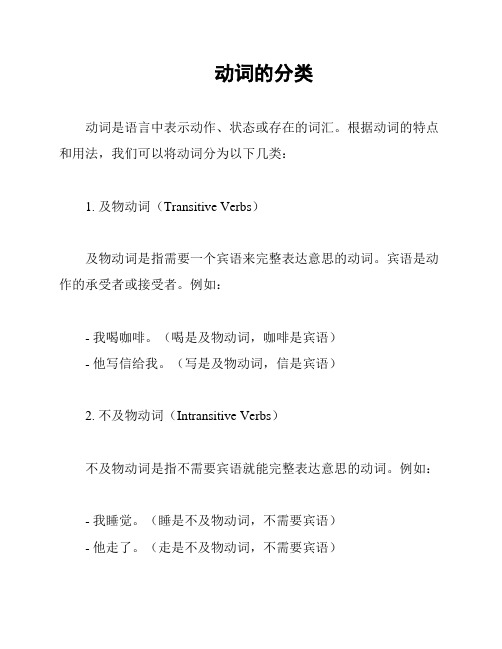
动词的分类动词是语言中表示动作、状态或存在的词汇。
根据动词的特点和用法,我们可以将动词分为以下几类:1. 及物动词(Transitive Verbs)及物动词是指需要一个宾语来完整表达意思的动词。
宾语是动作的承受者或接受者。
例如:- 我喝咖啡。
(喝是及物动词,咖啡是宾语)- 他写信给我。
(写是及物动词,信是宾语)2. 不及物动词(Intransitive Verbs)不及物动词是指不需要宾语就能完整表达意思的动词。
例如:- 我睡觉。
(睡是不及物动词,不需要宾语)- 他走了。
(走是不及物动词,不需要宾语)3. 连系动词(Linking Verbs)连系动词是用来连接主语和表语的动词。
表语是主语的状态、性质、特征的名称或形容词。
连系动词本身没有意义,只起到连接作用。
例如:- 她是医生。
(是是连系动词,医生是表语)- 这个花很漂亮。
(很漂亮是连系动词,花是表语)4. 助动词(Auxiliary Verbs)助动词是用来帮助主动词或表达其它意义的动词。
助动词通常和主动词一起使用,形成各种时态、语气、语态等。
例如:- 他正在吃饭。
(正在是助动词,吃是主动词)- 我已经完成了作业。
(已经是助动词,完成是主动词)5. 情态动词(Modal Verbs)情态动词是一类特殊的辅助动词,用来表示说话者对某种动作、状态或可能性的态度、命令、请求等。
情态动词没有人称和数的变化。
例如:- 我可以去吗?(可以是情态动词,表示允许)- 你应该努力研究。
(应该是情态动词,表示义务)以上就是动词的分类。
了解动词的分类有助于我们更好地理解和运用语言。
英语常考不带to的动词不定式汇总

常考的英语不带to的动词不定式:一:情态动词(Modal Verbs)情态动词后面一般接不带to的动词不定式。
如:Can:能够,会I can play the piano. 我会弹钢琴。
Could:可以,能够She could speak French fluently. 她可以流利地说法语。
May:可能,可以You may come in now. 你现在可以进来了。
Might:或许,可能会It might rain later. 或许等会儿会下雨。
Will:将要,会They will arrive at noon. 他们将于中午到达。
Would:愿意,会He would love to go with you. 他很想和你一起去。
Should:应该You should listen to your parents. 你应该听你父母的话。
Must:必须We must finish this project by tomorrow. 我们必须在明天之前完成这个项目。
二:特殊动词(Special Verbs)这些动词表示某种特殊含义,后面也一般接不带to的动词不定式。
如:Let:让,允许Let me help you. 让我来帮你。
Make:使...She made him angry. 她让他生气了。
Help:帮助Can you help me carry this? 你能帮我拿这个吗?Watch:看,观看We are watching TV. 我们正在看电视。
三:感官动词(Sensation Verbs)这些动词表示感官体验,也一般接不带to的动词不定式。
如:Feel:感觉She feels tired after work. 她工作后感到疲倦。
See:看,看见I see a bird on the tree. 我看到树上有只鸟。
Hear:听,听见Can you hear the music? 你听到音乐了吗?四:动词短语(Verb Phrases)这些动词由一个动词和一个名词或形容词构成,也一般接不带to的动词不定式。
情态动词(Modal Verbs)
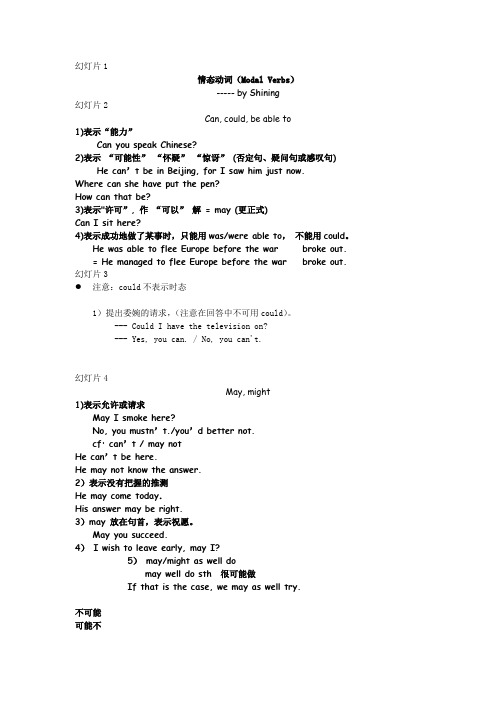
情态动词(M o d a l V e r b s)-----b y S h i n i n g幻灯片2Can, could, be able to1)表示“能力”Can you speak Chinese?2)表示“可能性”“怀疑”“惊讶” (否定句、疑问句或感叹句)He can’t be in Beijing, for I saw him just now. Where can she have put the pen?How can that be?3)表示"许可”, 作“可以”解 = may (更正式)Can I sit here?4)表示成功地做了某事时,只能用was/were able to,不能用could。
He was able to flee Europe before the war broke out.= He managed to flee Europe before the war broke out. 幻灯片3注意:could不表示时态1)提出委婉的请求,(注意在回答中不可用could)。
--- Could I have the television on?--- Yes, you can. / No, you can't.幻灯片4May, might1)表示允许或请求May I smoke here?No, you mustn’t./you’d better not.cf: can’t / may notHe can’t be here.He may not know the answer.2)表示没有把握的推测He may come today.His answer may be right.3)may 放在句首,表示祝愿。
May you succeed.4) I wish to leave early, may I?5) may/might as well domay well do sth 很可能做If that is the case, we may as well try.不可能可能不Must, have to●“必须”(义务、命令、必要)●否定式 must not (mustn’t) 表示“不许可”、“不准”、“禁止”等● You mustn’t smoke here.●Must we clean the classroom now?● No, you needn’t./ don’t have to.●2) “一定”(推测)●must be / be doing / have done●He must be an honest man.●He must be working in his office. 他一定在办公室工作呢。
语法学案情态动词ModalVerbs课件

语法学案情态动词ModalVerbs课件语法学案5:情态动词(Modal Verbs)助动词(auxiliary)主要有两类:基本助动词(primary auxiliary)和情态助动词(modal auxiliary)。
基本助动词有三个:do, have和be;情态助动词有⼗三个:may, might; can, could; will, would; shall, should; must, need, dare, used to, ought to. 上述两类助动词的共同特征是,在协助主动词构成限定动词词组时,具有作⽤词的功能:1)构成否定式:He didn’t go and neither did she.The meeting might not start until 5 o’clock.2)构成疑问式或附加疑问式:Must you leave right now? You have been learning French for 5 years, haven’t you?3)构成修辞倒装:Nowhere can he obtain any information about his sister. Hardly had he arrived when she started complaining.4)代替限定动词词组:A: Who can solve this crossword puzzle?B: Tom can.B: Yes, do.语⽓和态度。
1. 后⾯⼀般+动词原形2. ⼀般没有⼈称和数的变化即第三⼈称单数不加-s3. ⼀般只有现在式和过去式两种形式,但可以表⽰现在时间,过去时间和将来时间。
4. 情态动词没有⾮谓语形式,即没有to do, doing, done等形式现代英语语法还将be able to(能够), had better(最好), would rather(宁愿),used to(过去常常)等列为情态动词。
- 1、下载文档前请自行甄别文档内容的完整性,平台不提供额外的编辑、内容补充、找答案等附加服务。
- 2、"仅部分预览"的文档,不可在线预览部分如存在完整性等问题,可反馈申请退款(可完整预览的文档不适用该条件!)。
- 3、如文档侵犯您的权益,请联系客服反馈,我们会尽快为您处理(人工客服工作时间:9:00-18:30)。
1.情态动词主要有: can, could, may, might, must, ought to, shall, should, will, would, need, dare,had better, etc.
Yes, we can.
Can we pass our college entrance examination?
Yes, we can.
2. May 和Might May I watch TV after supper? 禁止,阻止 You mustn’t you may 允许,许可 Yes,__________________./ No, _______________________.
情态动词的虚拟用法
could might needn’t should shouldn’t have done have done have done have done have done have done 本来可以做 本来也许可以 原本不必做 本应该做 本不应该做 惋惜 惋惜 惋惜 责备 责备
I should advise you not to do that. 用于第一人称,表示 说话人的一种谦逊, You are mistaken, I should say. 客气,委婉 Ask Tom to ring me up if you should see him.
Should I be free tomorrow, I’ll come. If things should change suddenly, please let me know. 用于If从句中表示可能性很小的事情,译为“万一” “Why/ How+should”表示说话人对某事不能理解. Why should you be so late today?
-----Can I go now? -----Yes, you can. 表示“请求和允许” Could you wait a few days for the money? 表示“请求”,口语中代替can,使语气更委婉,主要用于 疑问句,答语用can.----Could I use your bike tomorrow? you can Yes,________. No, _______________. I’m afraid 表示“惊异,怀疑,不相信 Can this news be true? 的态度(主要用于否定句, How can you be so foolish? 疑问句和感叹句中)”
3.[04]---Mum,I’ve been studying English since 8 o’clock._____I go out and play with Tom for a while. --No ,I’m afraid not.Besides ,it’s raining outside Now. A.Can’t B.Wouldn’t C .May not D.Won’t
表客观“可能” 表主观“可能” •may ______________ can____________ 不可能 可能不 •Cannot___________ may not__________
A
4 should. We should be strict with ourselves. 表劝告和建议应该 You should keep your promise. 表推测,“可能,应该” They should have arrived by two o’clock.
实 战 演 练(practice)
1.[04] I_____ pay Tracy a visit ,but I’m not sure whether I will have time this Sunday. A should B.might C.would D.could 2.[04]---I don’t mind telling you what I know. ---You_____.I’m not ask you for it . A.mustn’t B.may not C. can,t D.needn’t
ought to
本应该做
责备
could have passed I _________________ my examination easily but I made too many stupid mistakes. If we had taken the other road, we might have arrived ____________________________earlier. You needn’t have watered the flowers, for it’s raining now. You ought not to have been so careless.
He must have gone over the article,hasn’t he _______? didn’t it It must have rained last night,___________?
aren’t you • 1).You must be tired, __________? • 2).You must go home right now, needn’t you ___________? • 3). You must have seen the film, haven’t you ___________? • 4). He must have met her didn’t you yesterday, ___________?
4.[04]---who is the girl standing over there ? ----Well,if you______know ,her name is Mable. A.May B. can C. Must D.shall 5.[04] You _____be tired ---you’ve only been working for an hour. A must not B.won’t C.can’t D.may not 6.[04]Mr White ______at 8:30 for the meeting , but he didn’t show up . A should have arrived B.should arrived C.should have had arrived D.should be arriving 7.[04] I often see lights in that empty house . Do you think I ____report it to the police? A .should B. may C. will D.can
Shall 可表“警告、威胁、许诺、决心”等 Why should he think that? Should 表“劝告、建议”, 译为“应当”;有时 也表“预测”、“可能”或表示说话人的惊奇、 愤怒、失望等感情。
What shall we do next? Shall we begin our lessons? Shall the driver wait? Shall he come in? — Come in, please.
用于第二,三人称陈述句中表 命令,警告,允诺或威胁
பைடு நூலகம்
6.表对过去的推测: 情态动词+have+down
• 对过去肯定推测: • 对过去否定推测: • 对过去的可能推测: • must have done • couldn’t have done • might have done
7.表猜测语气的反意疑问句的构成 isn’t he He must be reading,________? is it What he said can’t be true,____________?
用于第一, 三人称,表 征求对方 意见或请 示.
When shall my father be able to leave hospital?
You shall have the book when I finished it.
He shall be punished.
You shall be punished if you insist on doing it this way.
Revision Modal Verbs
October, 24 2010
Yes, we can.
Modal Verbs
情态动词
情态动词是中学英语学习中的一个
重点和难点,也是高考的重点考察 内容之一。 根据对历年来试题的分 析,高考的热点依次是:
1.)推测和可能性;
2.)情态动词+have done;
8.[05] I have lost one of my gloves.I_____it somewhere . A.must dropped B.must have dropped C.must be dropping D.must have been dropping
9.[05]According to the local regulations, anyone who intends to get a driver’s licence ____take an eye test . A.can B. must C.would D.may
用于祈使句表示祝愿 May you have many more days as happy as this one!
3. may 和can
• A computer _______ think for itself; it must be told what to do. • A. can’t B. couldn’t • C. may not D. might not
